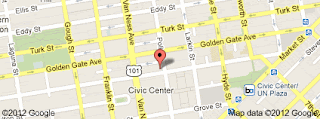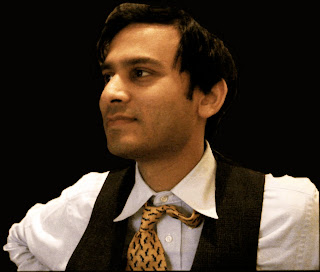From the Open-Publishing Calendar
From the Open-Publishing Newswire
Indybay Feature
Ballot Access Activists Ask for Support in San Francisco Superior Court, Wednesday 9:30 AM
Third party ballot activists call on supporters to show up and pack Room 302 at San Francisco Superior Court tomorrow - Wednesday, 10.24.2012 - at 9:30 AM. They and their attorney Gautam Dutta will be there to argue for reversal of the tentative ruling forcing them to pay a quarter of a million dollars in attorneys' fees.
 |
| San Francisco Superior Court, 455 McAllister Street |
 |
| Election lawyer Gautam Dutta is representing the ballot access activists facing a quarter million in attorneys fees for losing a lawsuit filed against the State of California. |
Richard Winger, Publisher, Ballot Access News
Jeff Mackler, Socialist Action
Rodney Martin, Reform Party
Jennifer Wozniak
Mona Field
Stephen Chessin, Californians for Electoral Reform (CfER)
Gautam Dutta, emphasizes, however, that his clients sued the State of California as individuals, not as representatives of the organizations they belong to.
Karnow did recuse himself at that hearing. Dutta says that supporters who showed up to fill all 45 seats in the courtroom helped, and It’s not hard to understand why. If supporters pack a courtroom behind these six activists, it's a strong indicator that their lawsuit represented significant public interest and does not warrant an order to pay attorney's fees.
Here’s how this Wednesday date came to be on the San Francisco Superior Court’s calendar, without too much legalese, in a timeline:
Feb. 19, 2009 In the wee hours of the morning, the California State Legislature put Prop 14, the Open Primaries Act, on the ballot, and at the same time passes implementing legislation. In this way, the Legislature hid the fact that the Top Two Primary Law would disenfranchise write-in voters -- because the implementing legislation would NOT appear on the ballot. According to the law they pass, all write-in votes in the general election will be discarded and no candidates will be allowed to identify on the primary or run-off ballot as “independent.” If not affiiliated with a party, candidates will be legally compelled to identify themselves simply with “No Party Preference” rather than “Independent.”
June 8, 2010 California passes Prop 14, the Open Primaries Act. This makes primary elections “open” to anyone of any party who can qualify to be on the ballot, and makes the run-off election a contest between only the two top vote getters of whichever parties. Third parties oppose Prop 14, on the grounds that it will exclude them from the general election.
July 28, 2010 Plaintiffs Winger, Martin, and Wozniak sue California Secretary of State Debra Bowen, challenging both elements of the legislation. Plaintiffs argue that discarding ballots sets a very bad precedent, and that voters should be empowered to write in their own choices, if they’re not satisfied with those on the ballot. They give the example of Lisa Murkowski, a U.S. Senator from the State of Alaska, who won the office as a write-in candidate.
They also argue that candidates should be allowed to identify as “Independent” on the ballot and that “No Party Preference” would make unaffiliated challengers sound bland and without principle.
Sept. 14, 2010 San Francisco Superior Court Judge Charlotte Woolard rules against Plaintiffs' lawsuit.
Sept. 19, 2011 California State Court of Appeal rules against Plaintiffs' lawsuit.
Feb. 20, 2012 California State legislature reverses the legislative provision that write-in ballots in the general election will be discarded. (Plaintiffs' have documents, dated in August 2011, which the Secretary of State sent to the legislature saying that this provision needed to be reversed to solve the problem posed by their lawsuit.)
Aug. 1, 2012 Judge Curtis E.A. Karnow orders Plaintiffs to pay nearly $250,000 in attorney's fees to the Intervenors.
Aug. 13, 2012 Plaintiffs ask Judge Karnow to reconsider his ruling forcing them to pay attorney's fees.
Sept. 17, 2012 Judge Karnow agrees to recuse himself from the case, and another judge denies Intervenors' attempt to cancel the hearing on Plaintiffs' Motion for Reconsideration.
Oct. 19, 2012 Judge Harold Kahn reassigns the Motion for Reconsideration back to Judge Karnow, and reschedules hearing on Plaintiffs' Motion for Reconsideration for Oct. 24, 2012, 9:30 AM
Oct 23, 2012 Judge Karnow issues a tentative ruling denying Plaintiff’s Motion for Reconsideration.
Oct. 24, 2012, 9:30 AM Judge Karnow will hear Plaintiffs' Motion for Reconsideration. Plaintiffs will attempt to have the ruling denying their motion reversed.
For more information:
http://www.anngarrison.com/
Add Your Comments
We are 100% volunteer and depend on your participation to sustain our efforts!
Get Involved
If you'd like to help with maintaining or developing the website, contact us.
Publish
Publish your stories and upcoming events on Indybay.
Topics
More
Search Indybay's Archives
Advanced Search
►
▼
IMC Network


